
International Journal of Transport Economics
Scope & Guideline
Connecting Economic Theory with Transport Practice
Introduction
Aims and Scopes
- Transport Policy Analysis:
Examining the economic implications of transportation policies, including regulatory frameworks, pricing strategies, and their effects on efficiency and service delivery. - Sustainability in Transportation:
Investigating sustainable practices within various transport sectors, including emissions reductions, energy efficiency, and the socio-economic impacts of green initiatives. - Maritime and Logistics Economics:
Focusing on maritime transport, logistics efficiency, and supply chain management, the journal analyzes factors influencing shipping, port operations, and intermodal transport. - Urban Transport and Mobility:
Exploring urban mobility issues, including public transportation, commuting patterns, and the integration of new technologies into urban transport systems. - Digital Economy and Transport:
Understanding the impact of digital transformation on transport, including the implications of e-commerce, big data, and digital platforms for transport services. - Behavioral and Social Aspects of Transport:
Analyzing how social factors, consumer preferences, and behavioral economics influence transportation choices and policy outcomes.
Trending and Emerging
- Impact of COVID-19 on Transport Systems:
The pandemic has prompted a surge in research analyzing its effects on various transport sectors, including shifts in consumer behavior, operational changes, and long-term implications for transport economics. - Digitalization and Smart Transport Solutions:
There is an increasing focus on the role of digital technologies in enhancing transport efficiency, including studies on smart supply chains, digital pricing strategies, and the integration of AI in transport services. - Sustainable Transport Practices:
Emerging themes related to sustainability are gaining prominence, particularly those addressing low-carbon development, electric vehicles, and the socio-economic benefits of sustainable transport initiatives. - Regional Development and Transport Connectivity:
Research exploring the relationship between transport connectivity and regional development is trending, particularly in the context of new infrastructure projects and their socio-economic impacts. - Consumer Preferences and Behavioral Insights:
An increase in studies examining consumer preferences, particularly towards shared mobility and electric vehicles, reflects a growing interest in behavioral economics within transport.
Declining or Waning
- Traditional Freight Transport Models:
There has been a noticeable decline in studies focused solely on traditional freight transport models, as newer, more integrated approaches to logistics and supply chains gain prominence. - Static Infrastructure Analysis:
Research centered on static infrastructure analysis without considering dynamic factors, such as changing demand patterns and technological advancements, is becoming less common. - Regional Transport Systems without Global Context:
Papers that only address regional transport systems in isolation, without linking them to global economic trends and implications, are decreasing in frequency. - Single-Modal Transport Studies:
The focus on single-modal transport systems, rather than intermodal approaches that consider connections between various transport modes, is waning as the need for integrated transport solutions grows. - Outdated Economic Theories in Transport Economics:
Research that relies on outdated economic theories and does not incorporate contemporary developments in transport economics is becoming less prevalent.
Similar Journals
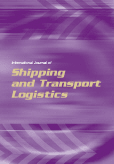
International Journal of Shipping and Transport Logistics
Navigating the Future of Logistics and TransportWelcome to the International Journal of Shipping and Transport Logistics, a premier academic journal published by INDERSCIENCE ENTERPRISES LTD that serves as a vital platform for researchers, practitioners, and students in the fields of logistics, transportation, and management. Established in 2009 and converging through to 2024, this journal is committed to advancing scholarly discussions and innovations related to shipping logistics, supply chain management, and the integration of technology in transportation systems. As evidenced by its Q3 rankings across multiple categories in the 2023 Scopus classification, including Business and International Management, and Management of Technology and Innovation, this journal is recognized for its contributions to the academic community. Though currently not an open access journal, it offers subscriptions that facilitate access to high-quality research and case studies relevant to contemporary challenges in the shipping and transport logistics sectors. Engage with the latest findings and insights that are critical for developing sustainable and efficient transportation strategies globally.
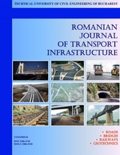
Romanian Journal of Transport Infrastructure
Transforming Transport Challenges into SolutionsWelcome to the Romanian Journal of Transport Infrastructure, a premier publication dedicated to advancing knowledge in the field of transport infrastructure engineering and management. Published by SCIENDO, this open access journal has been committed to sharing significant research and developments since 2012, ensuring that vital information is readily available to the global academic community. The journal's ISSN is 2286-2218, and it provides a platform for researchers, professionals, and students to collaborate and disseminate findings related to transport systems planning, design, construction, and maintenance. The Romanian Journal of Transport Infrastructure aims not only to contribute to scholarly literature but also to influence policy and practice related to transportation challenges. Our editorial team strives to maintain high standards of academic rigor and relevance, making this journal an essential resource for anyone involved in the transport infrastructure sector.
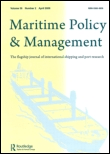
Maritime Policy & Management
Shaping Policies for a Sustainable Maritime WorldMaritime Policy & Management, published by Routledge Journals, Taylor & Francis Ltd, is a premier international journal that explores the complex and multifaceted aspects of maritime affairs. Since its inception in 1976, this journal has established itself as an essential resource for researchers, practitioners, and policymakers in the fields of Geography, Planning and Development, Management, Monitoring, Policy and Law, and Ocean Engineering. With an impressive impact factor evidenced by its placement in the Q1 category for multiple disciplines and high rankings in Scopus, this journal continues to contribute significantly to the academic and professional discourse surrounding maritime issues. Although it is not an open-access journal, it provides a wealth of rigorous peer-reviewed research that enhances understanding and informs best practices in the maritime sector. Positioned at the forefront of maritime studies, Maritime Policy & Management remains a vital publication for those aiming to advance knowledge and policy in this critical area of global development.

European Journal of Transport and Infrastructure Research
Pioneering research at the intersection of transport and infrastructure.The European Journal of Transport and Infrastructure Research (EJTIR) is a premier academic journal dedicated to advancing the field of transport and infrastructure studies. Established in 2000 and published by the EDITORIAL BOARD EJTIR in the Netherlands, this open-access journal promotes the dissemination of high-quality research through a global platform. With an impressive categorization in the Q2 quartile for Geography, Planning, and Development, as well as Urban Studies, and a Q3 ranking in Transportation as of 2023, EJTIR is recognized for its significant contributions to these vital disciplines. It holds commendable Scopus rankings, reflecting its impact and relevance in the social sciences. The journal's objectives include fostering innovative research, facilitating a dialogue among scholars, practitioners, and policymakers, and addressing contemporary transportation challenges. The open access model ensures that research findings are accessible to a wider audience, thereby promoting evidence-based decision-making in transport policies and infrastructure development. Researchers, professionals, and students are encouraged to engage with the journal's content, contributing to the ongoing discourse in this essential field.
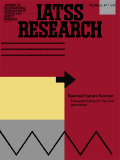
IATSS Research
Advancing knowledge at the crossroads of engineering and urban safety.IATSS Research, published by Elsevier Science Ltd, stands as a premier open-access journal at the intersection of engineering, safety research, urban studies, and transportation. Established in 2000, this esteemed journal caters to a diverse audience of researchers, industry professionals, and students eager to delve into innovative research that addresses pressing societal challenges. With an impressive impact factor and a consistent demonstration of high-quality scholarship, IATSS Research has achieved notable rankings within Scopus, including a top-tier position in Safety Research (Rank #13/109, 88th percentile) and Engineering (Rank #46/307, 85th percentile). The journal has evolved significantly since its inception, reflecting the dynamic nature of its converged fields from 2008 to 2024. By embracing open access, IATSS Research amplifies the reach of critical findings and fosters collaboration across disciplines, making it an invaluable resource for anyone invested in advancing knowledge and practices in modern engineering and urban safety.
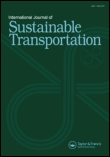
International Journal of Sustainable Transportation
Advancing Global Sustainability in TransportationInternational Journal of Sustainable Transportation, published by Taylor & Francis Inc, stands at the forefront of research in sustainable mobility, addressing critical challenges within the fields of engineering, environmental science, and urban planning. With ISSN 1556-8318 and E-ISSN 1556-8334, this journal is recognized for its exceptional quality, evidenced by its Q1 rankings across multiple categories including Automotive Engineering, Civil and Structural Engineering, Environmental Engineering, and Transportation, as well as a notable presence in Renewable Energy and Sustainability. Its impact is further amplified by impressive Scopus rankings, securing top positions in various fields, ensuring that it serves as a pivotal resource for researchers, practitioners, and policymakers dedicated to advancing sustainable transportation solutions. The journal actively disseminates cutting-edge research that informs sustainable practices worldwide, thus contributing to the development of greener transportation methods. As it continues its mission from 2007 to 2024, International Journal of Sustainable Transportation remains essential for anyone looking to explore innovative approaches to the transportation challenges of our time.

Case Studies on Transport Policy
Shaping the future of urban mobility with quality research.Case Studies on Transport Policy, published by Elsevier, is an influential journal in the fields of transport policy, urban studies, and geographic planning. With its ISSN 2213-624X and E-ISSN 2213-6258, this quarterly journal has consistently maintained a strong impact within its scope, attaining Q1 rankings in Geography, Planning and Development and Urban Studies, as well as a Q2 ranking in Transportation for 2023. The journal provides a platform for high-quality research and practical case studies that contribute significantly to the understanding and improvement of transport systems and policies worldwide. Its rigorous peer-review process ensures that published articles are of the highest academic standard, appealing to researchers, policy-makers, and professionals alike. With a strong presence in several social sciences categories, the journal ranks highly in Scopus, positioning itself as a critical resource for those engaged in the strategic development and analysis of transport solutions. Located in Amsterdam, Netherlands, it aims to bridge the gap between research and real-world applications, facilitating knowledge exchange and innovative strategies in transport policy.
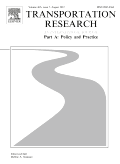
TRANSPORTATION RESEARCH PART A-POLICY AND PRACTICE
Fostering collaboration for a sustainable transportation future.TRANSPORTATION RESEARCH PART A-POLICY AND PRACTICE, published by PERGAMON-ELSEVIER SCIENCE LTD, stands as a premier journal in the domain of transportation research. With a robust impact factor and a distinguished reputation, this journal is ranked in the first quartile (Q1) across multiple fields, including Aerospace Engineering, Business, Management and Accounting, Civil and Structural Engineering, Management Science and Operations Research, and Transportation. The journal's comprehensive scope invites contributions that influence policy-making and practice in transportation systems, ensuring relevance in both scholarly and practical contexts. Additionally, the journal's convergence years span from 1992 to 2024, marking a significant history of impactful research. Published in the United Kingdom, it provides a vital platform for researchers, professionals, and students seeking to advance their understanding of transportation issues globally. As an essential resource in the field, this journal facilitates the dissemination of innovative ideas and solutions that shape the future of transportation.
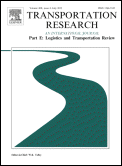
TRANSPORTATION RESEARCH PART E-LOGISTICS AND TRANSPORTATION REVIEW
Exploring Cutting-Edge Research in Logistics and TransportTRANSPORTATION RESEARCH PART E-LOGISTICS AND TRANSPORTATION REVIEW, published by PERGAMON-ELSEVIER SCIENCE LTD in the United Kingdom, is a leading academic journal that focuses on the complementary fields of logistics and transportation. Since its inception in 1997, this journal has been instrumental in shaping the discourse around various facets of transportation systems, supply chain optimization, and logistical efficiency. With an impressive 2023 impact factor and a prestigious ranking, classified as Q1 in key categories such as Business and International Management, Civil and Structural Engineering, and Management Science and Operations Research, it stands at the forefront of research in its domain. The journal is committed to disseminating high-quality research and offers open access options to enhance the visibility and impact of its articles. As it converges its content through 2024, it continues to provide invaluable insights to a diverse audience of researchers, practitioners, and students who are keen on advancing knowledge and practices in transportation and logistics.
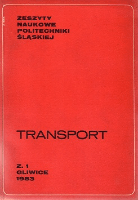
Scientific Journal of Silesian University of Technology-Series Transport
Fostering global discussions in transport engineering.Scientific Journal of Silesian University of Technology-Series Transport is an esteemed academic platform dedicated to the field of transport engineering, published by FAC TRANSPORT SILESIAN UNIV TECHNOLOGY. Established as an Open Access journal since 2008, it ensures wide dissemination and accessibility of research findings to foster knowledge sharing within the global community. With an ISSN of 0209-3324 and an E-ISSN of 2450-1549, this journal plays a critical role in advancing interdisciplinary discussions in applied Aerospace, Automotive, Civil and Structural, and Mechanical Engineering. Currently classified in Q4 across various engineering subfields according to 2023 metrics, it provides a platform for emerging research and insights into transport systems. Despite its recent establishment, the journal demonstrates growing visibility, contributing to a range of social science discussions in transportation with a Scopus percentile ranking of 18th. Researchers, professionals, and students will find valuable knowledge and innovative approaches in its pages, as it bridges theoretical and practical aspects of transport engineering.